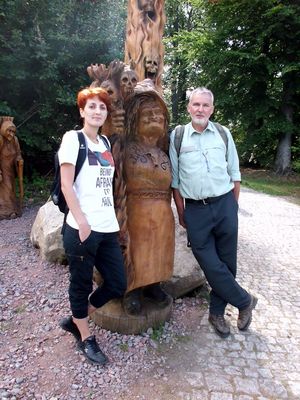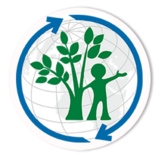- Akos Ivanyi, Ungarn
- Starford Mvula, Zambia
- Behruz Ilnazarov, Tadjikistan
- Lela Kakhniashvili, Georgia
- Carla Ocano, Uruguay
- Alfredo Rodriguez Zunino, Peru
- Rina Kristanti und Yayuk Siswiyanti, Indonesien
- Tibor Kadar, Rumänien
- Noor Hussein, Kenia
- Joaquin Garrido, Uruguay
- Lee Xiong, Laos
- Nehemia Gurusinga, Indonesien
- Edi Kurniadi und Kusdamayanti, Indonesien
- Myroslav Kabal, Ukraine
- Ekatherina Nevmerzhitskaya und Nikolay Nevmerzhitsky, Russland
- Le Xuan Toan, Vietnam
- Li Ming, China
- Ekaterine Balarjishvili, Georgien
- Gamin Gesa und Yopie Parisi, Indonesien
More than a professional exchange

A report by Lela Kakhniashvili, resource manager from Georgia
As part of my internship (hier in etwa das DATUM einbauen), I got to know the forest management system and forest planning in Germany. For this I spent a month in various institutions in the three federal states of Saxony-Anhalt, Hesse and Lower Saxony to see the processes of forest management and learn more about sustainable management.
Germany has a long history in forestry and a great advantage over many years of forest development according to the principles of sustainability. As a young professional, I was very interested in what this system is based on and what the basis of forest management is. Despite constant communication with German forestry professionals in Georgia, my idea about the German forests and their management was very superficial, or better said: Theoretical information can never replace practical experience. I think that's exactly what the Forest Expert Program aims to do: give young people a chance to gain valuable practical experience.
My internship started in the forestry office Ostharz in the Landesforstbetrieb Saxony-Anhalt. The forestry office Ostharz with its mountainous relief and its natural management is similar to the natural situation of the Georgian forest. Many forestry measures could be planned according to the German method, eg. the data recording.
In Saxony-Anhalt and in Lower Saxony and Hesse, I learned a lot about operational planning, control of timber harvesting, forestry concepts, care and control of private forests, forest protection, nature conservation criteria and much more. This experience always consisted of theoretical and practical elements, and that helped a lot to understand the new impressions.
The wide program of my internship has enabled me to see that despite small differences between the federal states, the organisational structures are similar. Transferring responsibility and management to forestry level increases the flexibility of operations management. Such an organisation would also be desirable in Georgia.
In addition to classic activities in the forest, it was interesting to discuss new projects. I found the GreenGain project particularly exciting, which was presented in the Chamber of Agriculture in Hanover. This focuses on mobilising biomass from public land and promoting its use of energy. Landscaping is a major problem in Georgia, especially when it comes to private ownership - much biomass is simply burned and wasted, such projects can achieve pretty good results.
Apart from professional development, I have learned a lot about German culture and tradition. I visited historic towns like Quedlinburg, barbecued with German foresters and I went hunting for the first time in my life. I was particularly tempted to walk on the treetop path in the Hainich National Park where I could observe trees from above.
I would like to thank the German Forestry Association and the BMEL, who gave me many valuable experiences, contacts and friendships with this internship. I thank all the foresters I have met. They have always tried to communicate not only their professional experience but also cultural and traditional aspects. Special thanks to my host families, where I was accepted as a family member.
The Forest Expert Program, combined with all the traditional and cultural elements, was for me much more than just a professional exchange!
Lela Kakhniashvili

